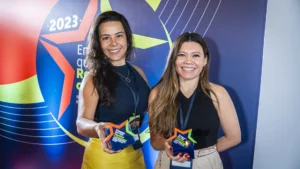The CEO reveals, on his YouTube channel, the strategies
that guide the company culture
When you founded the company Mobile (today the majority shareholder of iFood), Fabricio Bloisi was in a small room in the business incubator from Unicamp (State University of Campinas), alongside a partner, Eduardo Henrique. Today, almost 24 years later, the group has more than 6,000 employees in ten companies, such as iFood, Sympla and PlayKids.
“What makes iFood born as a startup of two partners and today having 5,000 employees is us dreaming really big, having the best people and being ambidextrous, that is, being extremely creative, innovative and agile and, at the same time, having the discipline to organize communication to continue growing”, says Fabricio in the second video of your YouTube channel.
In this video, he talks about the growth culture of Movile and iFood. “Now is the time to create great companies for Brazil”, says the CEO of iFood. “This allows us to generate more value here, more investment and more knowledge, which can and should be used to reduce historical inequalities, increase inclusion, improve education and the environment.”
Fabricio demystifies the idea that iFood's success happened because he had a brilliant idea and raised investment to grow a lot. “That’s not how founding a startup works. I didn't have one idea, I had a thousand ideas. And, by far, it wasn’t just Fabricio: it was people who behaved like owners, just as much as I did, and who made it work.”
He reinforces that as important as having an idea is knowing how to deal with it and create the discipline to turn it into reality. “Nothing in the history of iFood was an 'idea' and 'worked'. Everything was an 'idea', we tested, we made mistakes, we improved, lots of problems, we almost went broke, everything went wrong, oops, we figured out how to make it work.”
He lists the four principles of iFood's culture that make the business work: think big, empower people, always innovate and have discipline.
Think big
There's no point looking at the great entrepreneurs of the past and envying the idea or vision they had, says Fabricio. “The best ideas, which will generate major impacts to transform the world, are ahead, in the next five or ten years. Technologies will change even more in the coming years, and this could be the opportunity I need to come up with the next big idea.”
He gives some examples. One of them is the artificial intelligence. “The company where you work today will be completely transformed by artificial intelligence. At iFood, we teach the computer to learn and make the business work better.” Other examples are the demand for more sustainable energy and the emergence of Web 3 (with cryptoactives and cryptocurrencies) It's from metaverse.
“Think big: know that there is an opportunity to rethink how the entire business world works. How are you going to do that?”, provokes the CEO. “In addition to dreaming big, we put that dream into a goal that everyone knows, everyone has a date. We really believe that dreaming big is dreaming about results, innovation and purpose.”
Empower people
At iFood, it's not just the company that chases its big dream: each person is encouraged to do the same. “I see in practice the difference it makes working with passionate people. It's not Fabricio who makes the company work. These are the people who are truly committed to these dreams”, says the CEO.
For him, what makes the difference in growing quickly is having very good and passionate people to help the company develop. “I want to challenge you”, says Fabricio. “Are you in a place that has the best people? Do you look around and think that your colleagues are very good, they inspire you, are you proud to be there and learn every day from these people?”
He says that encouraging people to be better and better pays off. “We demand everyone to develop all the time. You need to hire the best, passionate people who want to do their best and build that purpose. And invest in them, develop, train and empower them. O role of the leader It’s not about approving and sending. It’s empowering very good people to achieve results.”
Another important point for Fabricio is facing the brutal facts, an expression he borrows from the American author Jim Collins, specialized in company growth. “It comes from the Stockdale Paradox, which says the following: I will be optimistic, in the end it will work out. But I'm going to face the brutal facts of current reality. At iFood, we are very sincere in saying what is bad. That's why we improve all the time. I need people who are open to listening to criticism so they can do better tomorrow.”
Always innovate
Another secret to growing in an environment of innovation, according to Fabricio, is to be an agile company, which follows the principles of lean startup. “It’s making plans for this week, setting goals for the next few days, even with long-term planning.”
In this culture, innovation is born and improved through constant work. “To solve problems, we test new things, see the results and the following week we test again, review results, to iterate, improve and learn very quickly”, says Fabricio. “We learn all the time, we are always formulating new hypotheses and seeing results with speed and agility. Embrace change, test it. If it goes wrong, adjust until it works.”
Find out more about innovation at iFood:
iFood is among the 10 most innovative companies in Latin America
Innovation: how iFood cultivates tomorrow's growth today
“The data driven culture is at the center of iFood’s innovation”
Have discipline
O ambidextrous thinking praised by Fabricio means combining creativity to come up with ideas and solutions with discipline to transform all of this into reality. “Discipline means being able to make a plan, set objectives at each stage, align with the team weekly or monthly and be clear about what didn’t work or worked,” he says.
He emphasizes that discipline does not mean telling everyone to follow the rules of a plan. “The plan is clear, the objective is clear and we have to have the discipline to communicate this to everyone. Not having discipline means that some startups are unable to grow and become large companies, because they lack the ability to organize themselves to maintain that growth.”
Following these four principles, says Fabricio, was more important than having an idea or raising money for iFood to grow. “They are the ones who will continue to make us successful in the next five or ten years. I hope they are useful for your plans too.”
To get to know the CEO of iFood better, also watch the video in which he tells his story -You can also subscribe to the channel to find out more about what he has to say about management and leadership, innovation and market trends, among other topics (so you receive notifications about new videos).


